June





June




07
Wednesday
JUNE DINNER
6:00pm for 6.30pm start
With guest speaker Victor Perton who will be presenting ‘Building Optimism in the midst of crisis’. DineIn: Members $39, non-Members $44.
09
Friday
SPECIAL MORNING BREAKFAST
7:30am – 8:30am
Special breakfast beverage for residents at Graduate House. Free for Resident Members, non-Resident Members $14, non-Members $20.
21
Wednesday
WOMEN’S FORUM
10:00am for 10:30am start
The topic of this forum is “Our alliance with the U S –does it need a re-think?”
The Women’s Forum group welcomes new members. Forum discussions are held in an informal and friendly atmosphere.
16
Friday
MEMBERS DRINKS NIGHT
5:30pm onwards
Come along in your own groups or come meet new friends and enjoy a relaxing, convivial, no fuss wind-down to your working week. Members and non-Members prices apply.
07, 14, 21, 28
BRIDGE NIGHT
7:15pm – 9:30pm
Wednesday
Join us for Bridge Nights every Wednesday evening. All levels of bridge players welcome. Player fees: Members $2, non-Members $5. Food and beverages at bar prices.
FOR BOOKINGS:
phone: (03) 9347 3428
email: membership@graduatehouse.com.au
website: www.graduatehouse.com.au
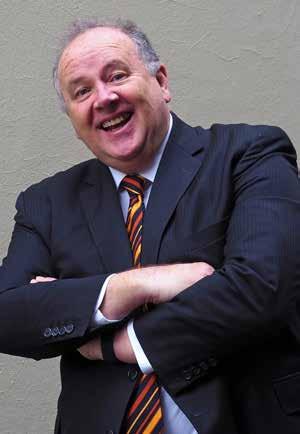
e party the year is here!
Friday, 28th July, 6.30pm till late
Party eme



Br ight & Colour f ul
• Party DJ

• Party Ph o Bo h

• Room up lighting
• Dance music om the 50s, rock ‘n roll 60s, disco 70s, 80s, 90s and b ond...
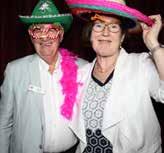


Professional entertainment services provided by Midnight DJs
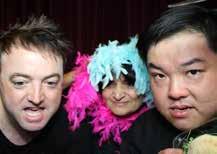
Booking is required for Non-Resident members. Call (03) 93473428 or email membership@graduatehouse.com.au

Free for Residents, non-resident Members $17 non-Members $22

Situated in the middle of The Netherlands (Holland) and about thirty minutes by train from Amsterdam, the Faculty Club is housed in a medieval solid stone building behind University Hall of Utrecht University and next to the Pandhof (the courtyard monastery garden of Cathedral Tower).
Achter de Dom 7 (meaning ‘behind the duomo’) was built in the 1400s as a claustral house for a canon of the Dom Cathedral in the centre of this ancient mediaeval city. After accommodating for various occupant types over many centuries - canons, prisoners, police officers and governors - Utrecht University began using the building in 1867 for academic purposes, converting it in 1998 for its current use as the ‘Lounge’, the local term used by the membership for their Club.
On your visit to Utrecht, we recommend that you use the ‘Lounge’ as the base for day trips exploring the many Early Middle Ages buildings and structures of the city to learn more about why this city has been the religious centre of the Netherlands since the 8th century.
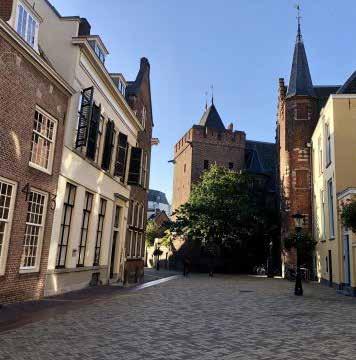
Because The Graduate Union has reciprocal rights with the Faculty Club you will be provided with access to their dining and bar facilities, as well as to areas where you can simply rest. Should you be on university business, the Faculty Club is where the academic community meets up on a day to day basis, as well as when entertaining visiting guests.
Like The Graduate Union, the Faculty Club also hires out rooms for meetings and functions, and hosts eight to ten events each year for its members (the equivalent of our GU Collegiate functions). The Faculty Club does not provide accommodation.
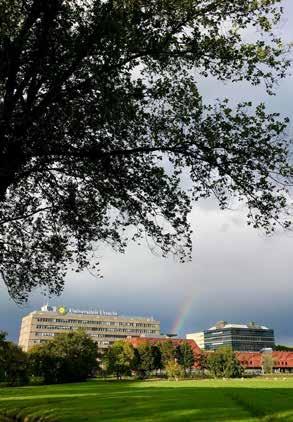
The Utrecht Academic Association Helios, the Faculty Club , was founded on 17th November 1998 as a university-wide association for employees, alumni and social organizations with which Utrecht University has ties. The Faculty Club was created after the example of English and American universities and, as the university's 'living room', has
a clear mission: to promote mutual ties between members of the Utrecht academic community.
The Faculty Club has been a popular meeting place for alumni and staff and their guests for many years. Sparkling gastronomy, cozy social activities, substantive debates and a beautiful hidden inner garden contribute greatly to this. As the university's 'living room', the Faculty Club is a place for meeting, knowledge transfer, connection and inspiration - a place where live music, debate evenings and special gatherings alternate and where you can catch your breath in the lovely inner garden. But also a place for a good conversation with a promoter, a culinary meal or an hour to recharge between two appointments in the city.
The Faculty Club is located at the rear of the Academy Building in the middle of Utrecht's city center, where you can only hear the bells of the Dom ringing on the terrace.
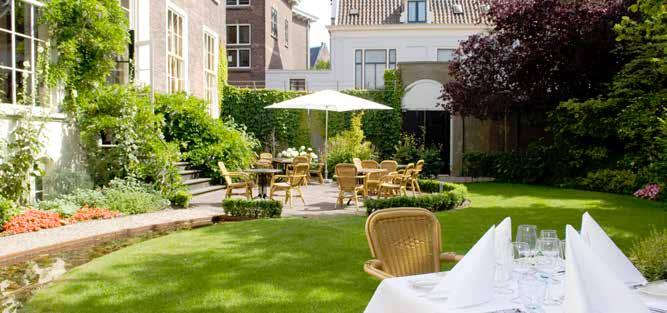
The efforts of many enthusiastic volunteers make it possible to organize dozens of lectures, themed dinners and networking drinks every year external link for alumni and employees. A great opportunity to make new contacts, meet colleagues and former fellow students and to keep abreast of the latest developments in Utrecht research and education. Introductions are very welcome!
The Faculty Club has more than 3,800 members. The vast majority are employees of Utrecht University or The University Medical Center Utrecht. In addition, many Utrecht alumni are members of the Faculty Club.

For more information and images, please visit: http://www.uu.nl/EN/informationfor/Other/facultyclub/ Pages/default.aspx
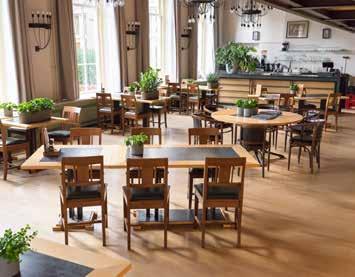
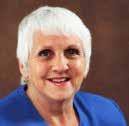
Spending the final chapter of your life in a nursing home is considered, by many, a fate worse than death. Others, however, have found that through enlightened, imaginative care even the frailest of lives can flourish. The key to such a transformation is to replace the constricting custodial centres of the past with a more informed, research-based approach. Associate Professor Rosalie Hudson’s new book Aging in a Nursing Home – Foundation for care is timely, responding to evidence of the urgent need for change described in the Australian Royal Commission into Aged Care Quality and Safety Final Report: Care, Dignity and Respect and its predecessor subtitled Neglect.
Let me begin with the subject of death. Often a hidden and cast aside topic, Death is a broad subject. In Victorian times, children were kept away from anything regarding sex or birth, but they sat at deathbeds, witnessed deaths, and helped with the care of the body. Children may watch the birth of a sibling but never see a dead body — many people reach the end of their own lives never having seen a dying person. (Tisdale, 2019, p. 1)
It is often said that being put in a nursing home would be a fate worse than death. But, we may console ourselves with the fact that only approximately 3% of older Australians are in permanent residential care. You may have heard or said it yourself, ‘Kill me if I ever get like that!’ or ‘Promise me you’ll never put me in a nursing home.’
One of my favourite books about nursing homes is by a young male American nursing aide, who pictured this scenario: ‘Nobody’s home: candid reflections of a nursing home aide’ (Gass T, 2004, p.118). Thomas Edward Gass wrote a heartfelt book of firsthand account of the reality of life in a nursing home and described his often unpleasant daily routines of cleaning, feeding and dressing the patients; trying to converse with them, although they are often senile; and mostly, attempting to preserve
their dignity. Perhaps Gass's most important observation is how uncomfortable everyone is around the home's residents — the staff, the relatives and the visitors.
Although nothing could be more unambiguous than the word ‘death’, its reality is often couched in euphemisms and misunderstandings. As an example, Dying with dignity - what does it mean? Eliminating suffering via euthanasia? Or acknowledging the inherent dignity of all older persons as relational: the care of one human being for another.
Of the many euphemisms, one of the most common is Passed ... to which I often press when discussing with nurses ‘Passed what?!' Passed away is very commonly used but what does it mean?
Language is particularly important in this multicultural environment. Here is an example of many that can lead to misunderstanding — Gone (‘Living in a nursing home…’, Hudson, R. p.179). Apart from Gone, there are many other euphemisms for death. We may think that we are being positive in our reluctance to speak of death’s reality but it may have the opposite effect.
Open discussion of death’s reality may include completing an ACP (Advance care plan), or some similar documentation, preferably in the resident’s own words. Practical preparation such as ACP allows for choices and wishes to be discussed and documented. Another way of addressing the issue includes making a Will and then there's the discussion it may invoke.
A recent article in The Lancet posits the lack of clear discussion about death. While many people are overtreated in hospitals with families and communities relegated to the margins, still more remain undertreated, dying of preventable conditions and without access to basic pain relief. The unbalanced and contradictory picture of death and dying is the basis for this Commission’ (Sallnow et al, 2022, The Lancet).
I believe we have every right to question decisions made about our own care or of those we care for. Questions such as ‘What is the aim (or goal) of this treatment?’, or ‘Are all these pills really necessary?’ and ‘How may we access a pain specialist?’ On the subject of pain relief, my bugbear is the PRN (Pro Re Nata) (whenever necessary) which often appears on a resident’s file, particularly when attached to analgesics. Who decides when it is necessary, and on what basis?
Part of the theme of my talk today is about 'Death being a part of life' and here are four of my favourite quotes:
• ‘The concept of death being part of life is, of course, not new, being attributed to Martin Luther [1483-1546]: ‘In the midst of life we are in death’.
And even more ancient:
• ‘Learning how to live takes a whole life, and, which may surprise you more, it takes a whole life to learn how to die’ (Seneca 55CE)
More recently:
• ‘We are born to die. . . Death is the warp and woof of existence in the ordinary, the quotidian, the way things are ... All our protest notwithstanding, the mortality rate holds steady at 100 percent’. (Neuhaus, 2000, p.15)
• A cartoon character says: 'The results of a study released today confirm that living is the number one cause of death'.
Which brings us to the subject of the 'Ideal death' And what is a good death? In looking for examples of an ideal death, I often quote Karen Hitchcock (Karen Hitchcock: Dear Life: on caring for the elderly.Quarterly Essay, Issue 57, March 2015, pp.1-78; p.64), who says:
'A good death – an ideal death – is preplanned, perfectly timed, excretion-free, speedy, neat and controlled.'
'Birth is not like this. Life is not like this. And yet we think we have a right to ask it of death.'
'We want a caesarean-section death. The only way we could come close to meeting all these criteria for a good death would be to put people down when they reach a predetermined age, before the chaos of illness sets in.'
Similarly to Karen Hitchcock are the sentiments of PD James, that wonderful mystery writer who describes ‘The Quietus”( The children of men, pp.92,93):'
Death with dignity for those 67 years of age, It’s purely voluntary, with forms signed in triplicate.
Passage to freedom from boredom, want & fear,
Led to the water’s edge, clothed in white, Band playing ‘Abide with me’, Gently led into low boats filled with weights, Quietly to drift and to sink.
And so, there are many interpretations of death with dignity. Of all the misunderstandings about life and death, I believe the common expression ‘there’s no communication’ is one of the most misguided. What is meant by ‘She can’t communicate’? Or (worse)
‘There’s nothing there!’
No flicker of the eye?
No response to a hand being held?
No flinching or verbal groaning when injured or hurt?
Some of the most profound human encounters require no words at all. When a volunteer was asked why she regularly visited ‘Amy’ who was confined to bed, without speech, and without family to visit, the volunteer said, ‘She just crept into my heart’. That’s why the volunteer would read to Amy, or simply chat about the weather or the traffic or the crowded trams. She wasn’t at all perturbed at the lack of verbal response.
Similarly, the frail gentleman who had cared for his wife at home for many years, now visiting her every day, responded to the kind nurse’s suggestion that he should care for his own health and visit less often. ‘She won’t know you’ve missed a day. She doesn’t know who you are’. He replied ‘But I know who she is’...so, inability to speak does not mean absence of communication.
That leads us to some of the issues around Ethical decision making (de Marco, 2016) around age care What information is given to enable ethical decision making?
'Nobody ever told ‘Vicki’ about advance directives or palliative care for her father.'
'No one told her of the option for him NOT to go to hospital or to have a blood transfusion'
'No-one told her that preserving life at all costs may not be the most humane goal'
'No-one told her about family meetings'
'No one told her ANYTHING!'
In my view one of the saddest sequelae to the COVID pandemic, especially in the early days, was the transfer of many aged care home residents, some dying alone in an acute hospital ward because visitors were not allowed and the only contact was with strangers dressed head to toe in PPE (Personal protective equipment) masks, hoods and gowns, looking like aliens from outer space.
Covid pandemic influencing end-of-life care meant many cases of lonely, isolated deaths. So what have we learnt so we can do this better next time? And the next time is already here as Covid cases has doubled in recent days.
To think about death is to raise many existential questions, such as
• Do you have fears or concerns about dying or death?
• What do you think the future holds for you?
• If you had one wish, what would it be? While we may be reluctant to broach the subject, these are some suggestions and there may be other essential questions as we all age and approach death. Is it important to have someone hold your hand? Yes, it certainly helps — however this is something we cannot ensure because it can be a matter of timing that some have to die alone. A nurse once said, it's such a shame that this patient didn’t have anyone by her side, to which her colleagues said, but she is always wanted to be alone; but again, we cant assume that in death.
One of the most common expressions from older people has to do with being a burden.
'I'm afraid that if my children have to make decisions about my care, they won't be able to handle the pressure. They'll just argue with each other, and they'll feel guilty, wondering whether they're really doing what I would want. I don't want to be a burden to them and I will do whatever I can in advance to see that I'm not.'
In a surprising twist, one writer says this about being a burden, ‘I do want to burden my loved ones’ (Meilaender, G, 2010). Meilaender remained convinced that, because of their love for each other, this may, at times, entail some form of burden. 'We have been a burden to one another for decades so why shouldn't I be a burden to her in death? So burden can have many different connotations.
One of the most fraught areas of aged care is the complaints mechanism, or lack thereof. This procedure should be clearly advertised, giving a positive impression of the way complaints are handled, like, when and how to report, e.g. when someone is in pain.
As an old-fashioned DON (Director of Nursing), I would do a ‘round’ each morning. When I approached Amy, frail & bed-ridden, she was holding her elbow, and when I remarked on it she whispered, ‘it was that night nurse, the one with the frizzy hair ... please don’t tell anyone, they’ll take it out on me’. And so it sounds odd to say that complaints should be welcomed - formal complaints should offer a voice for the voiceless.
Thanks to all the formal training, many chaplains or pastoral carers provide excellent care for nursing home residents, some basing their care on the belief that the resident (or person in the bed) is the expert and we are the listeners and it is a matter of inquiry and reflection rather than advice or dictating.
The reluctant pastor — Cedric visited the nursing home unfailingly twice every week. Nobody knew who appointed him and when, and no-one ever enquired about the effect of his visits, either on him or on the one resident he always sat with. Until ‘Phoebe’, one day confided in her trusted nurse. ‘Can you please tell that man I’d rather he didn’t visit me?’ Cedric was totally relieved. He’d been wanting to cease his visits for several months. With an appropriate expression of thanks for his service he was farewelled, not without significant relief.
Despite being one of the main reasons for residential care, dementia remains poorly understood, with many residents having the label ‘dementia’ on their formal paperwork but without any details about what type of dementia it is, who diagnosed it and when, and ignorance as to its outcome, leading one health professional to state, ‘you don’t die of dementia’. Well, actually you do. Dementia is the second leading cause of death, and the numbers are increasing. It ends with every organ in the body being affected until finally, the person is laid down, losing all capacity to function on its own. It is a terminal illness There is no cure and no known cause.
Of the over 100 different types of dementia, the three mains one are Alzheimer’s disease, Vascular dementia which is caused by a single large stroke or multiple strokes and DLB (Dementia with Lewy Bodies) which is usually associated with Parkinsons disease.
So if you encounter dementia and with early diagnosis, begin planning early while still having the capacity to make decisions. Dementia doesn’t happen quickly, many patients have several years (417 on average) of contented/meaningful living and realistic discussion about the future.
Music is a powerful stimulus to many dementia patients. There should be music therapy in every nursing home. 'Miss E', who never spoke a word, sang in perfect tune with all the right words, when the music therapist played ‘When I grow too old to dream…’
Many nursing home residents are missing out on effective palliation due to lack of education about its place in nursing home care, including in dementia care. Pallative care is not confined to last days or hours of life. Derived from the word ‘palliare’ which means to ‘cloak’ with care, it is also not confined to cancer: appropriate for any incurable illness.
Most residents have other multiple comorbidities, mostly incurable, fitting the criteria for pallative care. There are specialist palliative care services for complex needs and not all GP (General Practitioner)s or Geriatricians would claim palliative care expertise. Nursing home staff are also not uniformly educated nor skilled in palliative care.
Ethical issues in Palliative care should be considered, such as:
• avoiding overly aggressive, or futile treatment
• physical, psychosocial, spiritual care to be discussed and included in care plan.
• being person-centred because ever nursing home resident is different.
• families must receive sufficient, relevant information (Broady et al, 2018)
There's the issue of the misuse of medicines — they can be costly, ineffective, with unwelcome side effects. It’s not unusual to see a resident’s medication chart listing multiple pills and potions, with no goal and no review date, unchanged even when the resident can no longer swallow.
Here is one more case study to wrap up today's talk: Mrs P, aged 92, was transferred from hospital to nursing home with her diagnoses being dementia, osteoarthritis, diabetes and past history of breast cancer. There are also decubitus ulcers in the sacral area and both shoulders. She was malnourished, often refusing oral food and fluids and her family was told to expect her death ‘within a matter of days or weeks at most’. There were no goals of care discussed.
Nurses were concerned about Mrs P’s pain when her position was being changed or her wounds attended, and nursing staff were unsure of the family’s expectations. After many weeks, when her death had not occurred as expected, an atmosphere of hopelessness pervaded.
In consultation with the family and GP a palliative care physician was called in and a slow release morphine was prescribed. Within days, Mrs P’s appetite improved and she no longer resisted every attempt to change her position.
Family’s visits have now increased and they brought in some of Mrs P’s favourite foods. Her family’s despair were replaced by hope; they were reassured about the effects of pain relief and their fears of addiction allayed when opioids introduced. Her family made suggestions to be included in Mrs P’s care plan:
• to move her bed into the sunshine when possible.
• have aromatherapy to counteract offensive odours.
• have gentle physiotherapy/massage for contracted limbs.
• introduce appropriate music provided by family.
• to please use of her full name (even though difficult to pronounce).
• visit by the priest of her choice.
• palliative care leaflets & narcotics information provided in family’s first language.
After three months, and with regular adjustments to the care plan, Mrs P died, surrounded by her family. They had witnessed the benefits of a peaceful, dignified end to their beloved mother’s life and were keen to tell their friends of the benefits of palliative care.
With increased education and understanding, particularly on the part of some managers, I remain optimistic that the percentage of homes giving good care will increase, with:
• Celebrating/publishing good news stories.
• Ensuring appropriately skilled staff.
• Promoting adequate funding (e.g., tax increase).
• 148 Recommendations from Royal Commission into Quality and Safety (2019): each recommendation makes good sense and if followed, would transform residents’ care.
I finish my talk with words of wisdom:
• Returning to one of our first quotes from Seneca: Who is there in all the world who listens to us? ... oh, listen to me for a day, an hour, a moment, lest I expire in my terrible wilderness, my lonely silence. Oh God, is there no one to listen?’ (Seneca, cited in Saunders, 1988).
• I return to my favourite hero Dame Cicely Saunder's quote: How people die remains in the memories of those who live on.
References:
Broady R, Saich F, Hinton T (2018). ‘Caring for a family member of friend with dementia at the end of life. A scoping review and implications for palliative care practice. Palliative Medicine, Vol 32(3) 643-656.
De Marco, B (2016). The secret of palliative care: refusing treatment for someone with Alzheimer’s disease: Caregiver knows best. Alzheimer’s Reading Room, June 15, 2016.
Gass, T (2004) Nobody’s home: reflections of a nursing home aide Cornell University Press.
Hudson, R. (2016). Hopeful care for people dying of dementia. Journal of Gerontology and Geriatric Research, 5-6.
Hudson, R (2022) Living in a nursing home: foundations for care Springer Publishers.
Meilaender G First Things: A Monthly Journal of Religion and Public Life; New York Iss. 201, (Mar 2010): 25-26
Neuhaus, R (2000). ‘Born toward dying.’ First Things, p.15. Sallnow L, Smith R, Ahmedzai SH, Bhadelia A, et al; Report of the Lancet Commission on the Value of Death: bringing death back into life. Lancet. 2022 Feb 26.
Tisdale, S. (2019) Advice for future corpses (and those who love them): A practical perspective on death and dying. Gallery Books.
Many thanks for this interview
Wally: I have been wanting to interview you for some time. Please tell me a little about your background, leading up to you taking out membership of the Graduate Union.
If you are new to Graduate House and are reading The Graduate Union Newsletter for the first time, Graduate House marked 60 years as a Residential College in 2022. To commemorate this significant milestone, we started an interview series to learn more about our members, Residents and nonResidents.
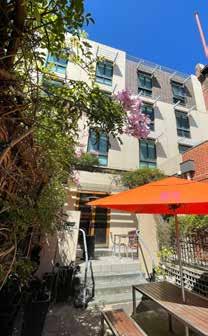
Councillor of The Graduate Union Council, Emeritus Professor Martin Comte OAM, tirelessly conducts these interviews. In this issue, he sits Life member Lesley Wallace Reid (we call him Wal or Wally) and Resident member Okan Yildiz. Here are their stories.
I’m 88 years of age and left school in Ballarat when I was 14 and came to Melbourne and worked in an office. I also went to the Melbourne Technical College and did a diploma in accounting. When I was 16 I applied successfully for a scholarship in the Air Training Corps, and at age 20 I had the alternative career choices of accounting or aviation. I chose the latter and subsequently the Air Force paid for me to get a commercial licence. But a friend advised me to also study law at The University of Melbourne, which I did over 7 years part-time, completing it in 1968. Then the same person persuaded me to do an MBA, which I completed in 1972. Neither of these degrees was related to my flying: I embarked on them in case I should develop a medical condition that would prevent me from flying. As it happened, when the pilots’ dispute of 1989 arose – with pilots going on strike and many never returning to the air, whilst others left the country to work for airlines overseas – I had another career I could take up after having been flying for 33 years: I was employed by a solicitor. About five years later I became the manager of a fund that provides benefits for pilots who lost their licence on medical grounds. I then became the Chair of the Trustees and that led eventually to my ‘retirement’. Whilst in semi-retirement, for
13 years I served as Chairman of the Ethics Committee at the Cairnmillar Institute. Since my retirement I have kept in touch with the university through the alumni, and I play Bridge, among other activities; I’m determined to remain aware of what’s happening around me and, where possible, make some decisions about it. It was a year or so after graduating with my MBA that I joined the Graduate Union as a Life Member. At that time I didn’t have a great attraction to anything that was going on there, so I was really a Life Member in name only. My involvement only began in the last four or five years when Kerry Bennett [the CEO] asked me to come to a meeting that was involved in fundraising and that revitalised my interest in the Graduate Union. I was hopeful that there was something I could do to contribute, and I was invited to become a member of the Fundraising and Benefactions Subcommittee.
Did you receive publications etc. from the Graduate Union over the intervening years before your interest was rekindled?
My recollection is that there were some, but they were minimal.
What was the particular attraction that caused you to consider becoming more involved? Presumably there were several other organisations that you could have become active in.
I was particularly interested in what had been mentioned to me as the possibility of getting
together with young graduates (principally from The University of Melbourne) to offer some focal points for discussion which we could explore or debate over a meal. This possibility suggested to me that there was a move ‘forward’ and I wanted to be part of it. Kerry was the inspiration for moving into that environment.
Tell me about your experiences on the Fundraising and Benefactions Subcommittee.
It’s an interesting area because fundraising is a challenge for any organisation. How can you persuade people to contribute to your cause? Your cause has to have more of a standing than others. In relation to the Graduate Union, I believe that people have become more inspired, as I have, to foster a younger membership –this is the way that our association will be sustained. If it keeps rumbling along in the same way as it has since I became active, it is unlikely that it will attract young graduates from the university. It has to be emphasised on these people that this is something that they can be part of and will enjoy now and into the future. We need to draw attention not only to our facilities, but also to the benefits of a graduate alumni. I am part of the alumni associated with the Law Faculty which facilitates interaction and support at different levels. Whilst such centres of activity and interest can appeal to people, a problem is that many graduates work in the city and a lunch-time arrangement is not generally feasible: a breakfast however is.
Do you think similar support and interaction is possible with Graduate Union, given that it is not discipline-focused? Why would a young graduate want to join the Graduate
Union? Wouldn’t joining their discipline-based faculty alumni be more attractive? What is (or could be) the ‘special appeal’ or ‘added benefit’ of joining the Graduate Union?
The notion of ‘cross pollination’ could be appealing: the fact that graduates, thinkers are brought together beyond their discipline base.
This is what I and some others are wrestling with. For not only do university faculties have their own alumni –universities themselves have their own, generally strong, alumni associations. Of course, when it was established in 1911 the Graduate Union functioned – to some extent at least – as the alumni association for The University of Melbourne; but this has not been the case for 50 or so years. And this raises the question of what we can offer that The University of Melbourne alumni association doesn’t. Accommodation as provided by Graduate House comes immediately to mind. But it seems to me that if we want to attract young graduates and ensure the ongoing vitality of Graduate Union, this alone will not suffice.
Can we ‘restore’ the high level of co-operation that once existed between Graduate Union and The University of Melbourne?
One of our council members, Natalie Gray, is pursuing this possibility with much vigour. There is an argument that although we claim to be an international graduate member association, we should not lose our roots that were firmly embedded in The University of
Melbourne. At the same time we can continue to pursue the international graduate membership model. Indeed, in this respect what we do is unique. The accommodation (and reciprocal accommodation) possibilities that we offer with other universities and graduates worldwide is sui generis. But I come back to the question: What can Graduate Union offer a 21 or 22-year old graduate? We need to differentiate ourselves from what the university provides. The monthly lunches, although principally attracting those who have retired, offer a great diversity in topics discussed by the speakers. It is this diversity of topics that I think can be explored more in relation to attracting young graduate members and others who are working. It is this teasing-out and sharing of thoughts across diverse topics that has potential to attract audiences and members. To refer again to ‘cross pollination’: here we have the opportunity to see something in our own speciality
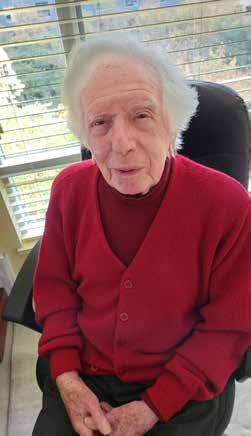
area of interest out of the eyes of someone from a different discipline field. This is a richness of the Graduate Union experience. We are offering people an opportunity to discuss the issues of the world in a much broader sense. Or, to put it differently, engaging in such diversity of thinking across disciplines can help us to see the world through a less narrow lens.
This makes eminent sense: thank you for expressing it so eloquently. Approximately half of our members are over the age of 60 and we realise that unless we can attract younger members our future will be in jeopardy. For this reason, and to rejuvenate the vitality of our organisation we need to start recruiting young graduate members. But if we recruit them we have to be able to offer inducements that will be immediately appealing to them and, at the same time, we need to explore possibilities for sustaining their membership. I would like to explore having Friday drinks after work once a month for young graduates, new members and others. But a challenge will be getting young people who work in the CBD (or out in the suburbs) to come to Carlton. Another possibility that I know you believe in strongly is the possibility afforded by mentoring of young graduates.
The mentoring process could involve utilising the diverse skills of our mid-career or retired members to engage with young graduates and residents. This could be done in several ways: ‘pairing’ a mentor to a young graduate or resident, and meeting over lunch or dinner or some other time; or arranging special speakers to address ‘suggested’ areas of interest, and so on.
We have a wealth of experience among our members of all ages, many of whom – particularly those who are middle aged or older – also have the time to mentor younger people. There is a potential ‘connection’ possible to share with young people the wealth and breadth of experience of our members.
I don’t necessarily see the provision of scholarships as an inducement for taking out membership. When it comes to scholarships we have to ask what we will get back. I do like the idea of having a membership pin or badge, which I know you are pushing. And I like having a competition and giving a prize for the best design. A challenge will to be to make it identifiable. (In fact, there was an attempt to have a pin some years back, but sadly nothing came of it.)
Imagine if we did have a Graduate Union pin and you are wearing it, and someone asks what it represents. What would you say?
The pin represents the value that I hold for the Graduate Union, a graduate membership association which, although affiliated with The University of Melbourne, is international. The pin signifies the possibility of camaraderie and reciprocal accommodation benefits in universities here and overseas. It also signifies cross-disciplinary exchange and dialogue, and a broadening of my horizons with graduates anywhere.
Wal, you have inspired me. Thank you! *****
Thank you for this interview, Okan. You have told me that you were born in Switzlerland, where you parents migrated from Turkey some years before. And I understand you are in Australia under a visiting scholar scheme to further your doctoral research from your university in Switzerland. You have been undertaking some work at The University of Melbourne since you arrived last November (during which time you lived in Graduate House), and are now spending some months at The University of New South Wales before returning to Switzerland later this year to complete your PhD studies.
Yes, there are some professors at both universities in Melbourne and Sydney who are experts in the interdisciplinary field I am researching – which involves both law and economics. I’m so pleased that some of these important contacts were arranged for me before I came to Australia – it has made my studies here even more productive and enjoyable. I have had access to a ‘hotspot’ of experts in Melbourne, and now in Sydney. In fact, my main supervisor in Sydney has already put me in touch with several other key people in the field I am studying. Likewise, having been able to arrange accommodation at Graduate House before I even arrived in Melbourne made my time there so easy. Being associated with the university, I assumed it would be of a high standard – looking back at it I was not wrong. I’m in Sydney until the beginning of July.
I’m pleased to hear that you believe you made the right decision in choosing Graduate House.
Yes, definitely the right choice. But I did not like the restricted hours for breakfast and dinner. I would like both of them to be extended. Certainly, coming from Europe, I’m not accustomed to eating dinner so early. However, I have really enjoyed making a specific group of friends –and given that some of us live relatively close to each other in Europe, we might even catch-up when we return to our respective countries. I met so many friendly people from the first day I arrived. There was never a sense of “we just sleep and eat here and then go on to university”: we did stuff together; we made the most of our stay in Melbourne. And it was such a positive surprise to find
members, including Council members, who have a long history with Graduate Union and Graduate House, and who come here often and engage with the residents.
This is lovely to hear. How can we make the experience even better? How should we market Graduate House?
I think it would be good to really emphasise that PhD students and others are welcome to come for a short stay – it’s not only for students coming for the entire academic year. Somehow, get across the message that Graduate House is not like ‘normal’ university housing: I felt a much stronger sense of ‘connection’ at Graduate House. Part of this was because it is not primarily for undergraduate students; at the graduate level there is a difference between the ‘needs’ of younger students compared to those who are older. So if I were to give any advice, I would suggest that you revisit the information you provide on the internet – emphasise more the possibility of short-term stays and the different demographic from normal university accommodation colleges.
Tell me a little about some of the experiences you had whilst staying at Graduate House. What sorts of things did you and your new group of friends do?
Oh, there are several things. One group of people went together
to Tasmania and other places. But we also organised short trips to places like Wilson’s Prom, for example. We camped – and even though we weren’t prepared for camping we still did it, and it turned out to be fun. And we organised other trips as well, including one to Ocean Grove for some surfing (well, it was at least an attempt at it). Another time we rented a car to see the Southern Lights, but didn’t see them – so we went star gazing instead! It was fun.
I understand that now you’re in Sydney you intend to go swimming with the sharks?
Yes, and I also plan to go scuba diving on The Great Barrier Reef, as well as visiting Kakadu National Park. And before returning to Switzerland I will visit New Zealand and Indonesia. After that I will concentrate on finishing my PhD. I plan to hand in my thesis at the end of this year or the first month of 2024. After that I will have a 12-month internship working in the legal field – and then take the bar exams. Other possibilities will then open-up, including working as a lawyer, continuing as an academic or becoming a judge, but I won’t force myself into any of these: it will have to be something that I’m really interested in; I have an open mind on that.
Okan, I’m sure all of the Graduate House community wish you well not only in your PhD studies, but in your future employment. I have no doubt that you will be success in whatever you do.
Thank you very much.
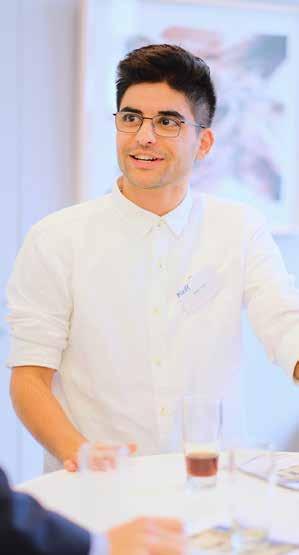
Mr Kingsley Davis OAM has been a member of The Graduate Union since 1st September, 1966 - he had thus been a member for 57 years. As he explained to other Members, his reason for joining, he saw immediately the value in paying just a few guineas - which was a lot for that time - to become a Life Member just after his graduation with a law degree. He thence was admitted to the legal profession in 1967 and signed the Victorian Bar Roll in 1969. Given his significant governance and legal experience,The Graduate Union invited Kingsley to become a Councillor in 2011. With elections in the following year (2012) he was then elected to Council by the international graduate membership of this incorporated association.
Kingsley gave generously to this organisation his time, expertise and experience. He provided probono legal guidance on several significant and major issues since his appointment to Council and this has greatly assisted in not only addressing these matters for the benefit of our members (both resident and non-resident) and the organisation (particularly in improving governance standards) but also in minimising our legal expenses - something that is particularly important as The Graduate Union is a charitable not-for-profit agency.
Among the positions Kingsley held on Council included Chair of the Membership and Marketing subcommittee from 2012-2015. In this role he provided inspirational leadership which saw benefits to the organisation in terms of improved membership services and numbers. He gave very
generously of his time to this role and was always available to our many members to hear and address their concerns.

Kingsley was nominated Vice Chair of Council of Graduate Union in 2016-2017; and was Chair of the Governance and Nominations subcommittee from 2015-2018. In his role, he contributed particularly to the major change of rules.
His great contribution to The Graduate Union is all the more remarkable when we learned of his other heavy workloads for other organisations at that time:
• working full time as a Barrister at the Victorian bar, providing also tutorial support for up and coming Barristers;
• providing pro-bono legal services support in St Kilda every Thursday evening;
• contributing to the Scouting Association every Tuesday night and to weekend training retreats for Scout Leaders three to four times a year.
Kingsley was awarded Medal (OAM) in the General Division of the Order of Australia on Australia Day 2015 for service to the community through youth and heritage organisations, and to the law.
At the 2022 Chairman’s cocktail party, a special award was presented to Kingsley (in absentia) in recognition of exemplary service to The Graduate Union.
Our deepest condolences to the family of Kingsley Davis OAM. Rest in peace.
(1942 - 2023)
Kingsley was admitted to the Bar in 1969 and practised almost exclusively in Family Law and Commercial Law with great distinction. He achieved the rare distinction of being in practice for more than 50 years.
Kingsley had three readers: Patricia Hudson, Maurice Gland and Angela Lee and was always available to give advice and guidance to younger practitioners in his areas of practice when approached.
He had two children: Sheldon and Carolyn and two grandchildren who were a source of ongoing pride and delight to him.
Kingsley was also a man who contributed very substantially in a number of respects – in his own local community; in the Scouting movement – as to which he achi eved high distinction in his own right as well as being an essential and contributing member of the administration for many years , and in areas of law of a pro bono nature as well as his membership of various standing committees in areas of interest.
These included the Court Procedures Reform Committee, the Crime Practice Committee, the Juries Practice Committee, and the Causes Practice Committee.
He was essentially a quiet and self -effacing man with an extensive knowledge of the areas and procedures applicable to the areas in which he practised.
For many years, Kingsley ran the Family Court moot segment of the Readers ’ Course with real ability.
On one occasion, two misguided readers stole his registry stamp to facilitate an argument for an adjournment on the basis that there were no filed documents to which the court could refer. Kingsley simply smiled benignly and kept the miscreants on their feet for two hours discussing inherent jurisdiction and the various discretions available under the Family Law Act.
He later observed that "he had thoroughly enjoyed himself, and that he was confident that the offenders had learned a great deal more law than they had ever wished to".
Kingsley was an able and well-prepared advocate who enjoyed the respect of both his col leagues and the benches before whom he appeared.
The recognition conferred upon him by the award of the OAM was richly justified.
Source https://www.vicbar.com.au/news-events/vale-%E2%80%94-r-kingsley-davis-oam

Lou Coutts passed away surrounded by family on Wednesday 12th April around 7:00pm, aged 89. After enduring a slow growing cancer over several years, he declined rapidly over the last couple of weeks.

Louis Coutts has been a member of The Graduate Union since 1st October 1960. 2023 marks the 62th year of his membership.
Louis Coutts has been regularly contributing musing, stories of interest and poems for the Graduate Union Newsletters. His writing ranges from commentaries on politics, economics and management to stories of his extensive travels and quiet observations from his daily life. He was the guest speaker at the April 2018 Luncheon in which he spoke on Australia and the Rule of Law.
Louis Coutts was a lawyer and Honorary Life Member of the International Commission of Jurists (Vic). He studied management at various American universities, including Stanford, Colombia, Kellogg and the University of California; and founded the Hawthorne Academy in California, which provides practical courses in different areas of business. He has published two books:
• Four Leaders (Brolga, 2012) explored the qualities that make a good leader by examining four heroes of polar exploration: Nansen, Scott, Shackleton and Amundsen. This book examined how different people in different situations managed their role as a leader.
• The 6-Hour MBA (Manjul, 2013) for everyone in the work place. The book demystified management, challenges current assumptions, and introduced the concept of leadership.
Our deepest condolences to the family of Louis Coutts. Rest in peace.
We know that his passing will leave a great sense of emptiness to so many people across Australia and around the world. He lived a rich and fruitful life and constantly tried to make the world a better place. He had a long and successful career in law and business management where he maintained strong relationships with a wide range of appreciative colleagues and clients. He made many friends through his various interestswine, cricket, football, table tennis, writing and literature, cinema, international affairs, travel, music and the cosmos are among the many fields that inspired him. Above all was his sense of justice and humanity.
We are enormously grateful to have been nurtured by his wisdom and sense of humour.
His final wishes were that we should drink Champagne and not be sad. So, thank you for being part of his life and I’m sure you will have many fond memories as we do.
Kind regards from his children, Maryanne, John, Damian, Marg, and Brendan.
Spring
Sad winter gone, sweet spring begun.
How many more sweet springs to come?
So many springs for me are past
The final one must come at last.
And of all those pleasant seasons gone,
Not any ever lasted long.
So short a time for blossoms pure
To achieve souls lasting cure
So short a time for springs to come
Until for me all springs are done.
This year’s mid-year appeal will focus on increasing our membership, especially for recent and early career graduates. This is a joint appeal by the Fundraising & Benefactions, and Membership & Marketing subcommittees of The GU Council.
For this Appeal we plan to make The Graduate Union Membership more attractive and appealing to young members – indeed all members. We are currently exploring ways to involve all age-groups and make better use of our excellent facilities. This will include a welcome to new members and a thank-you to donors to this appeal later in the year.
Approximately half of our members are over the age of 60. For The Graduate Union to be viable into the future we need to attract young and mid-career graduates to enjoy the benefits of membership that we all appreciate.
We are inviting you to nominate a new member, and for the 1st year this will be at a reduced price.
Alternatively, we will use your donation to help recruit new members, especially those in the above age brackets. Hopefully, new members will be self-supporting in the future years to come.
This one-off Membership Offer will be $100 (and not the normal fee of $150). (Additionally, we no longer charge a joining fee.)
Our Mid-Year Appeal mailout will be sent to all Members in early June. We trust that you are enjoying the benefits of your membership and will proudly spread the word.
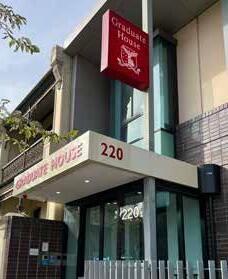

Members of Soroptimist International of Melbourne Inc. A0010754A held their monthly meeting at Graduate House on Wednesday 26th April 2023. Among those in attendance at the meeting were SI Victoria President, Kerry Beer and Dr Ya Hui Hung, past recipient (2004) of the SI Dame Margaret Blackwood Soroptimist Scholarship. Dr Hung who became a member of SI Melbourne in 2018, spoke about progress with her research on Nieman Pick C. Soroptimist International (SI) of Melbourne is a supporter of the Australian NPC (Niemann-Pick type C) Disease Foundation. https://www.npcd.org.au/
Soroptimist International (SI) founded in 1921, is a global voice for women. It is a world-wide notfor-profit organisation for today's professional and business women and they are committed to a world where women and girls together achieve their individual and collective potential, realise aspirations and have an equal voice in creating strong, peaceful communities worldwide.

Soroptimists inspire action and create opportunities to transform the lives and status of women and

girls through a global network of members and international partnerships. SI currently operates in 13 countries across the South East Asia and Pacific region. They are Australia, Cambodia, Fiji, Hong Kong, Indonesia, Malaysia, Mongolia, Myanmar, New Zealand, Papua New Guinea, Samoa, Singapore and Thailand. SI Australia has 70 clubs Australia wide with over 1500 members.
With a sharp focus on issues affecting women and girls, Soroptimist International South East Asia Pacific (SISEAP) is one of the strongest women’s organisations in the region. Soroptimists concentrate their efforts on issues of current global significance. Their members work within their own communities to identify local needs and opportunities and follow the formula “think globally, act locally”.
Issues such as domestic violence and other genderbased violence, girls’ access to education, the lack of women in leadership and the gender pay gap, as well as women’s health issues and reproductive rights are just some of the topics that highlight gender inequality around the world and therefore drive Soroptimist projects and advocacy campaigns at a local level.
On Saturday 24th June 2023, Soroptimist International of Melbourne Inc. will be back at Graduate House for their 75th Charter Anniversary Celebration Luncheon; President Shirley Reynolds and members will welcome Graduate House members to join with them on this occasion. Please refer to page 25 for more details. The Anniversary Luncheon with guest speaker, Her Honour Judge Wendy Wilmoth, will focus on the plight of Women and girls in Afghanistan, and the vital work of the Australian Association of Women Judges in bringing judges from Afghanistan to Australia, and will also raise funds for the AADO (Afghan Australian Development Organization). For more info: simelbourne@siswp.org
This scholarship is awarded to a female Doctor of Philosophy Science or Master of Philosophy Science candidate who is undertaking substantial research in a discipline that aligns to plant, animal or viral genetics.
In 1988, The University of Melbourne (UoM) and Soroptimist International of the South West Pacific (‘SISWP’) conducted an appeal to raise money towards a fund to endow the Dame Margaret Blackwood Soroptimist Scholarship to commemorate Dame Margaret's contribution to the international soroptimist community and celebrate her academic achievements. Dame Blackwood enjoyed a long and distinguished career at the University, both as an academic and in service to the wider University community. She was a scholar of high repute in the field of genetics and was the first woman to become a Deputy Chancellor of the University.
Dame Margaret Blackwood died in 1986. She was one of the earliest members of the Soroptimist Club of Melbourne, which was founded in 1948, being its President from 1957 to 1959. She was well-known and widely respected throughout the international soroptimist world, being accorded honorary
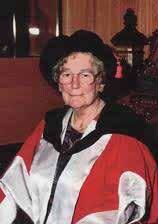
Dame Margaret Blackwood. Her special achievements include:
• First woman Deputy Cancellor at Melbourne University.
• First woman appointed Honorary Life Member by the Association of Women on Campus Melbourne University.
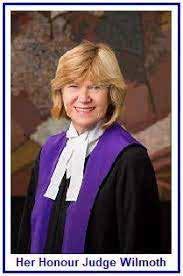
• OBE 1981.
• First constructor Australian cipher used by RAAF (Royal Australian Air Force).
membership of all soroptimist clubs in the South Pacific in 1973, an honour which was confirmed in 1978 when the organisation became SISWP.
In March 1988, The UoM and SISWP initiated an appeal for The Dame Margaret Blackwood Soroptimist Scholarship Fund, to be administered by The UoM and provide a grant for a post-graduate student for the study in Genetics, either plant, animal or viral at The University of Melbourne. The aim was to raise about $50,000 from this appeal. It was also stipulated that the UoM be authorised to use the funds in any other way it sees fit to honour Dame Margaret if the amount raised significantly exceeds or falls below target. Whether the fund fails to reach, or exceeds, its target of $50,000, the University could, at its discretion apply the fund to another appropriately related academic purpose. The appeal raised the sum of $45,415 and additional donations totaling over $30,000 were made to the fund over the period 2007 to 2010. All income from the capital sum, and any accumulations and additions together form a fund called Dame Margaret Blackwood Soroptimist Scholarship (‘fund’)
In order to implement the trust terms, The UoM determined to award the scholarship to a female postgraduate student to undertake study at the University in plant, animal or viral genetics and each scholarship was awarded upon the recommendation of a selection committee comprising -
• the dean of the faculty of Science or nominee;
• (a professor of Genetics nominated by the head of the school of BioSciences; and
• a representative of Soroptimist International of the South West Pacific approved by the dean.
Two esteemed members of the Soroptimist International of Melbourne Inc. Dr Christine Paton, a SISWP Past President 1988-1990, and Dr Anne Binkley, SI Victoria Regional President 2011-14, are the current representatives of the Federation on the selection committee.
From 2004: Dr Ya Hui Hung, PhD, BSc(Hons), BMus. About 2 million Australians and 300 million people worldwide live with one of 7,000+ rare diseases (Australian Government, Department of Health). 70% of rare diseases are of genetic origin. 95% of rare diseases have no approved treatment. People born with rare genetic diseases often live with lifelong disabilities and die prematurely.
Trained in molecular biology and biochemistry, Dr Ya Hui Hung is dedicated to developing effective treatments that will improve health outcomes for people living with rare genetic diseases. Her PhD studies at The University of Melbourne set her on the path of rare disease research. Her PhD project contributed to the understanding of ATP7A protein function, a major copper transporter in the body. Mutations in the ATP7A gene underlie a number of rare neurological disorders, which include Menkes disease and ATP7A-related motor neuropathy.
Her current research focus is on Niemann-Pick Disease Type C (NP-C), a rare metabolic disorder with progressive neurodegeneration. This research evolved from her early postdoctoral research that investigated the interplay between copper and cholesterol metabolism in the development of neurodegeneration and Alzheimer’s disease. Her NP-C research has contributed to the mapping of the metallobiology landscape of NP-C and identified early neurological changes in an NP-C mouse model that may have clinical implications for human carriers of the NPC1 gene. She is now exploring new treatment solutions for NP-C, which include using the mRNA technology to replace the faulty genes that cause NP-C.
Ya Hui Hung is a co-organiser of the Australian NP-C conference.

Ebert lab and Persson lab, or it could also be 'Plant Cell Wall research lab'. My project title is 'Investigating the function of cell wall biosynthetic genes in Marchantia polymorpha'.
It is a great honour to be one of the recipients of the 2022 Dame Margaret Blackwood Soroptimist Scholarship. I am a fourth year Ph.D. student at The University of Melbourne, and my research aims to characterise the function of two genes in building

the plant cell wall of a liverwort called Marchantia polymorpha. M. polymorpha has a simple genome that makes it easier to unravel the genetic basis of complex biological processes like cell wall synthesis. Better understanding how cell walls are made and respond to stresses such as drought, could lead us to manipulate wall composition for more drought resistant plants. This scholarship is particularly meaningful because Dame Margaret Blackwood left a legacy, not only as a renowned scientist, but also as a soroptimist who uplifted other women and girls. It reminded me that great science requires first and foremost a safe, inclusive and a supportive environment. So, through this scholarship, I funded myself and a master’s student Miss Amelia Keynton to attend a prestigious plant science conference in Germany this year called ‘Botanik-Tagung’. It was an incredibly productive journey that has contributed to our personal and professional development as plant scientists. I’d like to offer my deepest gratitude to Soroptimist International and the judging panel for the scholarship and the members of SI Victoria for making me feel so welcomed at the 100th Anniversary Luncheon. Thank you.
Neke Ibeh 2022
Gallego Romero Lab
Project: Profiling genetically driven alternative splicing across the Indonesian Archipelago.
One of the most vital regulatory mechanisms influencing the functional capacity of genes is alternative splicing (AS). Despite the key role that splicing plays in human adaptation and the immune response, this phenomenon remains uncharacterised in most global populations. One notable region is the Indonesian archipelago, the world’s fourth largest nation by population. In order to elucidate the genomic and regional drivers of gene regulatory variation in this area, we used a set of 115 Indonesian samples from three traditional island populations spanning the region’s genetic ancestry cline. Using a hierarchical event-based statistical model, we identified a high degree of functionally significant differential splicing across these groups. Moreover, an immune signature was detected across these events, suggesting differential immune pressure between these islands. We also characterized population-specific patterns of splicing regulation by comparing our data to European data. Altogether, this project will contribute greatly to our understanding of the underlying genetic architecture of a widely uncharacterized region.

The plight of Women and Girls in Afghanistan, and the vital work of the Australian Association of Women Judges in bringing judges from Afghanistan to Australia, and raise funds for the AADO (Afghan Australian Development Organization)
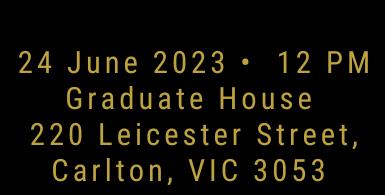

We are saddened to learn of the passing of Father Bob Maguire on 19th April 2023. Father Bob visited Graduate House many times over the years and he has always told staff members that he loves coming here. He was the guest speaker at our Twilight Lecture in July 2015, where he spoke about "Winning Happiness". In the same year, he spoke at our Monthly Luncheon, and his topic was "Fantasy Spurs Social Activism".




Father Bob also attended the Chairman's Cocktail party and Ramadan Iftar Dinners in previous years. He was last seen at Graduate House in April 2022. We share some photos taken during his visits with members/staff.
We will miss you, Father Bob. Rest In Peace.
Ex-resident Sharmilla Acharya dropped in for a visit on 21st March. Currently residing in Canada, she is back in Melbourne for a holiday with her husband and two children.
Sharmilla stayed in the new wing of Graduate House in 2011 when she was undertaking her one-year Masters of Engineering (focus on Water Resources) at The University of Melbourne. She reflected that living in Graduate House was such a wonderful experience and that she made many friends during that year and are still in touch with most of them.
Sharmilla said she enjoyed every moment of her stay in Melbourne and have missed the city so much that she had to bring my family along to visit and see what a wonderful place it is.
Thank you, Sharmilla for visiting us, it was a pleasure to welcome you and your family and we hope you will visit us when you visit Melbourne again!
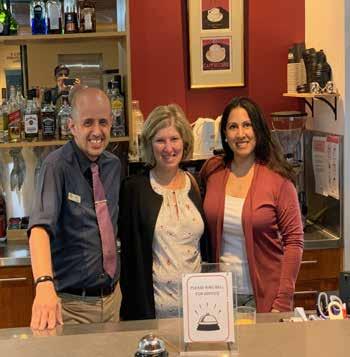
We congratulate resident member Liqian Zhang, recipient of the 2023 Maurice H. Belz scholarship at The University of Melbourne.

Established in memory of Maurice Henry Belz, who, in 1948, became the first head of the Department of Statistics at The University of Melbourne and who was the foundation Professor of Statistics in 1955. This award is granted to students achieving the highest aggregate score in the second year subjects Probability and Statistics. Students are nominated for these awards by the University teaching staff.
After studying in the Master of Data Scvience last year, I transferred to MSc, majoring in Statistics and Stochastic Processess. I am honoured to receive the Maurice Belz Scholarship, named after Professor Belz who drew inspiration from music and drama in his work on statistics. Parallelly, piano and poetry, programming plus puzzles profoundly propel my progress in pondering my project.
The scholarship will provide a financial boost for an extra semester of study due to my transfer, to my passionate commitment to exploring the berry esseen bounds for studentized nonlinear statistics, where Stein's method is employed to quantitatively tackle the normal approximation.
Liqian Zhang
In his message (Annual Report/Melbourne Graduate 2023) to members, Chairman Mr Vincent MIrabelli had a parting wish — that there be a new signage to the front façade and carpark directional signage which will place Graduate House more prominently on the Carlton Parkville and The University precinct map.

We are pleased to report that the front signage is now installed and it lights up at night.
This signage is clearly visible from across University Square and will be eye-catching to future passengers from the Parkville Metro station (currently under construction as part of the Metro Tunnel project), which is due to open in 2025.
A new, quirky, bright green “smart bench” on a Carlton median strip is taking street infrastructure to a new level.

Situated at 313 Drummond St, the street bench has been designed with sensors that help collect data on how much it has been used, and the results have been dramatically higher than Melbourne’s older metal benches.
Since 1st February 2023, the new green design has been used 3872 times, according to the recent City of Melbourne data, while the existing metal bench on the median strip has only been used 666 times. This means that while the existing bench has been used, on average, eight times a day, the new design has an average daily use of 43.
While only a pilot program, Lord Mayor Sally Capp said the past couple of months had proven that “data-led design works”.
“We’ve set a new benchmark for street furniture in Melbourne,” Cr Capp said. Good design can really increase the way community infrastructure is used – especially for a bustling area
like Carlton.
The quirky design has also encouraged the council to continue to work with industry leaders, to create more social spaces for the community.
“We’re already applying what we’ve learned from this popular bench to other projects including the redevelopment of Grattan St and Fishermans Bend Gateway sites,” the council’s education and innovation portfolio lead Cr Davydd Griffiths said.
The smart bench is part of Participates Melbourne’s Reimagining the City Challenge. •
Photo credit: Liana Hardy
Source: https://www.innercitynews.com.au/carltonsnew-smart-bench-a-bright-example-of-data-leddesigns/
RJ Living contacted us to share this Scholarship offer to Residents of Graduate House. If you are interested in applying, go to: https://www.rjliving.com.au/pages/ scholarship or contact them at scholarships@rjlivingfurniture.com

RJ Living is committed to helping students achieve their educational goals and providing students with the resources and support they need to succeed in their academic pursuits. That is why they are proud to offer their very first scholarship program that is designed to provide financial assistance to students who are in need and demonstrate a commitment to their design education. This scholarship is open to both undergraduates and graduate students who are attending an accredited university within the Australia.
RJ Living scholarship provides a one-time reward of $1,000 to pay for tuition, books, computers, room, and board, or any education-related expense.
There are no educational requirements and no application forms. This is their way of giving back and supporting individuals who want to pursue their dreams through education.
Australian Institute for the Certification of Inspection Personnel (AICIP)
Asia Institute
Australian Society for Music Education (ASME) Victorian Chapter
Australia India Institute
Australian Academy of Technology and Engineering (ATSE)
Australian Asian Association (AAA)
Australian Intercultural Society
Australian Psychological Society
Australian Urban Research Infrastructure Network (AURIN)
Carlton Parkville Probus
Carlton Rotary
Centre for Eye Research
Australia
Construction, Forestry, Maritime, Mining and Energy Union (CFMEU) Manufacturing Division
Committee of Convocation
David Jensz
Department of Infrastructure Engineering
Department of Mechanical Engineering
Electrical and Electronic Engineering
First Super
Geoffrey Dye - Athanasian Trust & Filming Project
Institute of Senior Officers of Victorian Education Services
Institution of Civil Engineers, Victorian Local Association
Languages and Literacies Education Academic Group, MGSE
Lysander
Melba Group
Melbourne Graduate School of Education
Melbourne School of Population and Global Health
Melbourne School of Professional and Continuing Education
Melbourne Soroptimists International
Melbourne University Car Club
Mental Health First Aid
Michael Quin
Melbourne School of Professional and Continuing Education (MSPACE), UoM
Opticum Pty Ltd
Order of St. John of Jerusalem Knights Hospitaller Incorportated
Parkville Conference of St Vincent de Paul
Per Capita Inc. "“The John Cain Luncheon
Peter Doughty
Peter MacCallum Cancer Centre
Phoenix Australia - Centre for Posttrauamtic Mental Health
RACI
Retired Veterinarians Group
RIC Business Development and Innovation
Slavery Links
Social Education Victoria
Stroke Association of Victoria
The Graduate Union Collegiate Events and Governance Meetings
The University of Melbourne
UoM Department of Social Work
Victorian State Secondary Past Principals' Association Inc.
The process of organising a function at Graduate House was great. Rosie is an outstanding event manager. The function room provided a great space and the food was outstanding with the quality very fresh. All the participants loved it. Your staff were extremely helpful.
Yolanda Di Ludovico, First SuperI have been booking meeting rooms for years through Rosie and am very thankful for all her help. The function room and spaces suit our needs and the food is always good. The staff at Graduate House are always great and very helpful.
Veronica Shingler, AURINWe thank the following organisations for their event bookings at Graduate House in March and April 2023
220 Leicester Street, Carlton, Victoria 3053, Australia
Telephone: +61 (0)3 9347 3428
Australian Business Number: 55 610 664 963 Incorporated Association Registration Number: A0023234B
ww.graduatehouse.com.au
